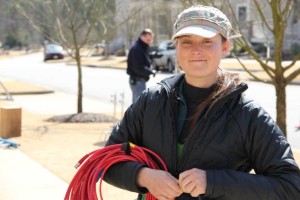
Miller was sentenced to two years in prison and eight years on probation and fined $10,000. This was the first time in memory that a filmmaker has been sent to jail for a film-related death.
The incident has drawn worldwide attention and triggered campaigns to improve worker safety on shoots, including efforts led by Steven Poster, president of the International Cinematographers Guild (IATSE Local 600). Jones was a member of the ICG. “This offers a sense of closure,” said Poster of the judicial outcome. “We just hope this encourages workers to remember the spirit of Sarah.”
He added: “There is no such thing as cinematic immunity. No movie or TV show is worth a life. We have safety regulations in place. We hope this sends a message to everyone in the industry that safety measures have to be followed at all times.”
The ICG last year released a “Set Safety” app, created by industry professionals. It carries safety bulletins and guidelines along with a list of industry safety hotlines. Users can report safety concerns anonymously, in order to allay fears that they may get punished or even lose their jobs.
Meanwhile, as part of yesterday’s overall plea agreement, similar charges were dismissed against Miller’s wife Jessica Savin, the producer of Midnight Rider, a biopic about rocker Gregg Allman. The film’s executive producer Jay Sedrish got no jail time but was sentenced to 10 years on probation and was fined $10,000. He entered a so-called Alford plea (asserting innocence of the charges but admitting the evidence would persuade a judge or jury beyond a reasonable doubt), which the judge accepted.
In addition to his jail time and fine, Miller has to perform 360 hours of community service. He’s also barred from directing during the duration of his sentence, including the probation period. Sedrish is also restricted from directing during his probation, including serving as a first or second assistant director. Miller immediately started to serve the prison term after sentencing.
At issue in the case was the question of whether the production had received permits or otherwise been cleared to shoot on the CSX railroad tracks, one of the busiest freight lines in Georgia. CSX emails indicated that the railroad turned down a request for permission to shoot. The film’s location manager also failed to secure permission to shoot but allegedly never told Miller, who claimed not to be aware of the absence of a specific permit.
On the day of the shoot, the film’s crew were told they would have only a minute to get off the tracks should a train be coming. They in fact had less than a minute when they heard a whistle and saw that a train was barreling toward them. The train hit a metal hospital bed that was placed on the track trestle for what was supposed to be a dream sequence. Jones was struck by a piece of flying debris, knocking her toward the train, which killed her. Seven other crew members were also injured, some seriously. Miller was among those hurt.
“We are not now, and never have been, seeking revenge for Sarah’s death,” according to a statement put out yesterday by Elizabeth and Richard Jones, Sarah’s parents. They added “we do want those responsible to be held accountable and are satisfied with the terms of the agreement reached between the district attorney’s office and defense attorneys.”
“This was a one-time off event, brought about a whole series of miscommunications,” said Ed Garland, Miller’s attorney, defending the director’s overall safety record. “He had no thought in his mind that he was in danger. He wouldn’t have been out there because of his two children if he had imagined there was any danger. But mistakes get made, and these should have been prevented. But because he was the director who is not in charge of safety — there are all kinds of other people in charge of safety under the contracts — he got the blame.”
“There is nothing this court could do to really bring justice to this case,” said presiding Judge Anthony Harrison. “I hope that this day will contribute to your goal of sending a message of safety to the industry” and that it would “give some meaning to this tragedy,” he told the parents. The father read a letter in court from Sarah’s brother as part of a victim impact statement. Her brother pointed out that there is now heightened awareness by crews of possible safety lapses and dangers during a shoot. “Sarah has changed the industry at the cost of her own life. I hope her death is not in vain.”
The most recent and indelible precedent for the Sarah Jones court proceeding is when director John Landis and four other crew members were tried on charges of involuntary manslaughter for a 1982 helicopter accident on the set of Twilight Zone: The Movie. Actors Victor Morrow, Myca Dinh Le and Renee Shin-Yi Chen were killed. After a nine-month jury trial during 1986-1987, Landis and the other crew members were acquitted of the charges.





